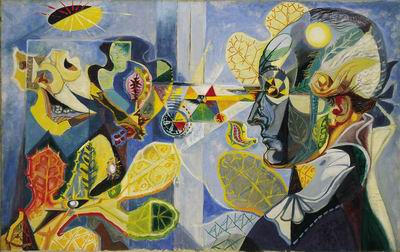
|
Lorna Mills and Sally McKay
Digital Media Tree this blog's archive OVVLvverk Lorna Mills: Artworks / Persona Volare / contact Sally McKay: GIFS / cv and contact |
View current page
...more recent posts
Arthur Zajonc on CBC Ideas: How To Think About Science

André Masson, Goethe and the Metamorphosis of Plants, 1940
This podcast is really good. Here are my notes: Zajonc rhymes with Science. He is a quantum physicist with an investment in experience and phenomenological contemplation. He has studied Goethe, who undertook contemplative scientific investigation of phenomena, biology and colour. Zajonc talks about how both he and Goethe believe that through careful observation of nature, something changes within ourselves that allow us to have insights. For Zajonc, this is how science works. The insights, as when Newton saw an apple falling and connected it with the movement of the moon, come first. The analysis and computation comes afterwards.
He has some skepticism about mathematics because the structures of math itself lead us into other dimensions where we have insights that we could not achieve through observation. We reduce the messy, variable and multi-dimensional experience of nature (the world) to a pared-down, one or two dimensional model. The model is very useful, and widely applicable, but it leaves out a lot of information. Models, he says, are a form of idolatry. We become enamoured of the model because it is a form of our own thinking, and we spent our enthusiasm on the model instead of on the phenomena. He uses the example of quantum physics in which the fundamental elements of matter are not “things” at all.
He talks about how our technologies remove us from experience, remove us from the “aesthetic and moral dimension” of sensual experience. He gives the example of the Manhattan Project, in which it was impossible for the scientists working on the project to experience the phenomenon of the atom bomb until it had been detonated. Without experience, morality is lost. We advance our technologies, but our morality cannot keep up. Genetics and neuroscience are currently in this predicament. Zajonc is also studying spiritual thinkers because he is invested in contemplation. He values religion not because of it’s particular dogmas (though he shows respect for the "honourable" place of religions in history) but because religious study is a study of experience. And, he reminds us, so is science.